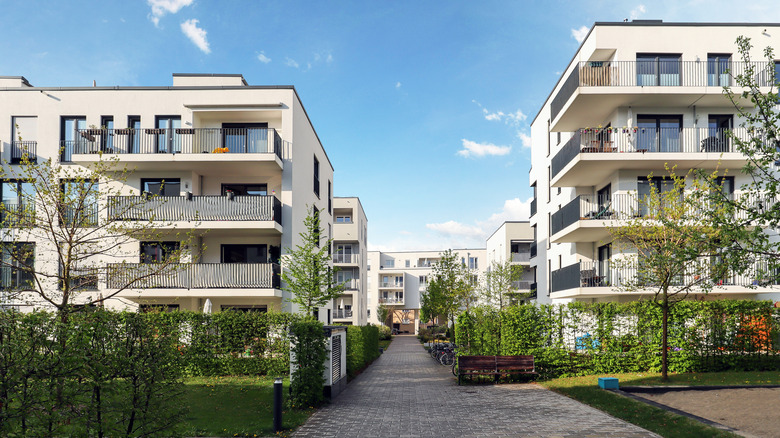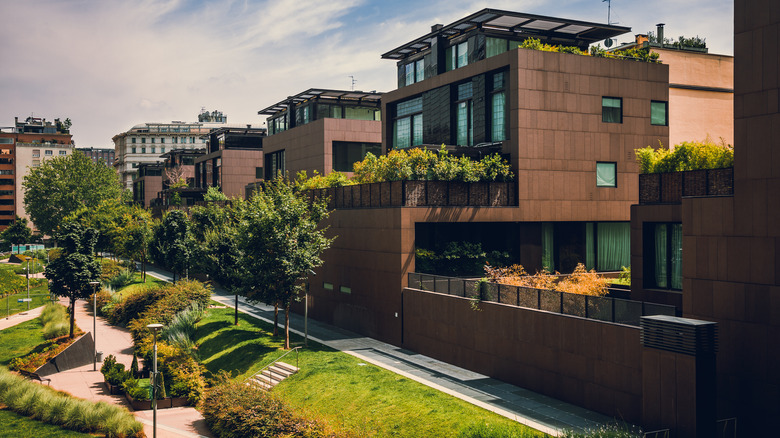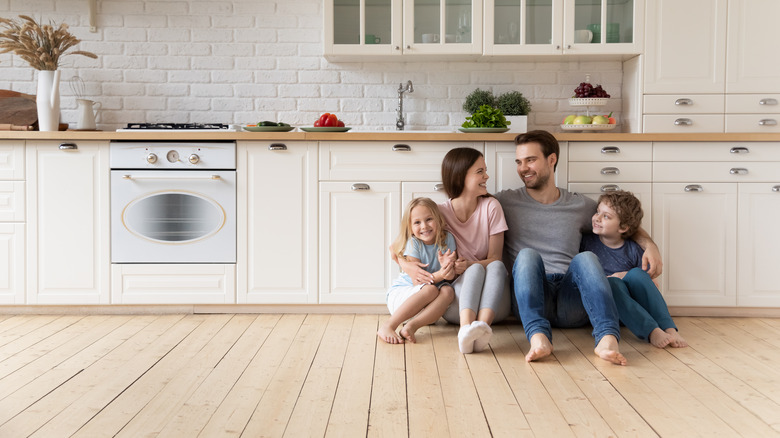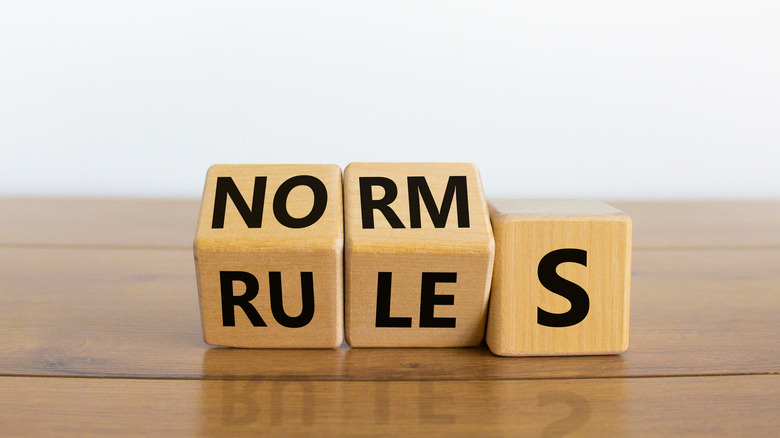Upsides And Downsides Of Apartment Living
Apartment living is something that many millions of Americans have and continue to experience. The National Apartment Association reports that almost 39 million people in the United States live in apartments, and this number is only going to continue rising over the coming years.
An apartment can offer the perfect living space under certain conditions, or it can represent the very thing you may be trying to move away from as you seek out a new lifestyle in a different kind of dwelling. Weighing the positives and problems that come along with living in an apartment can help you make a better decision when it comes time to move again (which Americans do more than 11 times on average, according to The Atlantic).
With a move coming roughly every five years (via My Moving Reviews), taking time to understand your current living situation and how you can make improvements to it ahead of the next transition into a new home is the best way to consistently get the most out of the place you are calling home. This may be in a luxurious city apartment, or it might be in a detached housing unit that's all your own. With these features in mind, it can be just a bit easier to weigh your choices in terms of apartment living versus a life spent in a house or other type of dwelling.
Pro: Apartments are easier to furnish and maintain
One major benefit of living in an apartment is the burden of furnishing your living space, points out Moving.com. Apartments are smaller than houses, and they tend to sport a standard wall size throughout the property. In contrast, houses can be built on wide-ranging specifications and incorporate immense decorative and furnishing needs as a result of the completed floorplan. Homeowners often have multiple communal rooms to add couches and chairs to, bedrooms that demand beds, dressers, and more, and a kitchen that will require a large enough table to swallow up the cavernous space of a dining area.
Apartments, on the other hand, are much more condensed, and a great apartment achieves this squeeze in terms of square footage without feeling constricted. The end result sees far fewer rooms to furnish and smaller spaces within each unique area of the home. An apartment can easily support a smaller kitchen table without it feeling like a compromise with the available space in the room, and they tend to demand less in terms of living room furnishings than a larger home will require. For those looking to enjoy a comfortable life without having to splash out to incorporate an army of seating options and decorations, apartments offer a clear-cut winner.
Pro: Amenities are typically built into the space
In addition to reduced maintenance and furnishing costs, apartment buildings offer a plethora of great amenities built right into the landscape of the building, states Moving.com. These can range from 24-hour front desk and security services to pools, gyms, and rooftop lounge areas.
Apartment buildings sacrifice some of the added space for home customization that others living in houses enjoy, and as a compromise, apartment structures typically include these sorts of features as a bonus. Saving on your gym membership or relying on the front desk attendant to accept a package for you while you are away can be a real difference-maker when it comes to finding a great new place to live. Added amenities have become a staple of modern city living, and the convenience of these add-ins can make your apartment feel like more than just a place to relax at the end of a long day.
With these features taken into consideration, your apartment becomes a part of your lifestyle beyond the confines of your home. Likewise, apartments are typically found in more densely populated spaces than detached houses, making them a built-in part of city communities. This means that you can likely walk to the store, movie theater, and other essential pieces of your hometown with ease. In addition to the various included amenities that save you time and money (via Realestate.com), the city itself becomes a feature of your lifestyle.
Con: Less overall space
While apartment living requires less in the way of furnishing, many apartments can easily feel cramped as a result of the smaller overall footprint. This is especially true for families that have designs on expanding their numbers in the coming months or years.
The smaller size of an apartment is often small potatoes for renters or owners when they first move into the property. Many people, when searching for a new place to live, conduct a considerable amount of research into the right kind of living space for their needs and visit multiple properties to gain a sense of the right mix of features. But it's easy to forget that your needs will change over a surprisingly short period of time. The five-year timeframe that typically sees a person (or family) move into and back out of a home of any sort is full of personal growth and immense change.
The small space that an apartment offers may be perfect for your current needs, but this doesn't mean that it always will. In contrast, a home is built with much greater outward mobility in mind. The larger room sizes and overall square footage difference in a home are perfect for a continually expanding and growing lifestyle and family. To think of it another way, Storage Café reports that new single-family houses are larger than they were 10 years ago (at 2,611 square feet on average) while apartments are shrinking (down to 1,156 square feet).
Con: Increased regulatory oversight
Moving.com notes that alongside a smaller footprint for your living space, you have to contend with increased regulatory oversight and community rules that dictate some of your choices as a resident. Whether you own the property or rent it, there are likely stipulations that you are obliged to follow regarding guests, pets, and other features of routine life. For instance, it may be perfectly acceptable to walk down your driveway half-clothed to pick up the newspaper or mail, but this is off-limits when doing so in the mailroom of a community building.
Likewise, you may be limited on the number of guests you may invite over to your property, and noise policies in residential buildings might force you to start or end a gathering earlier or later than you might hope. As well, when conducting renovations to a home, you may be required to gain approval from the building management team or board before launching into a project, even one that you might consider minor or cosmetic. Once a remodel is underway, your building may also place restrictions on the hours or days that your contractor can access and work on the apartment, making the project longer or costlier than it would be in another setting.
Increased oversight and community rules are there to protect the interests of all the building's tenants, but they can be a burden in certain circumstances.
The bottom line
There are many great things to be said about living in an apartment. As Moving.com points out, the space provides faster access to local community features because you're far more likely to be living right in the heart of your town or city, and apartment dwellers have far less to think about when it comes to furnishing a home.
However, moving into an apartment locks you into some important decisions that aren't present for homeowners. Instead of owning complete control over your decisions regarding the property, you will live as a part of the community, and decide collectively on major renovations that affect others in the surrounding units. The common areas, roof, and other elements of the property that extend beyond your front door (but still play a role in your day to day life) are not within your control, and when living in an apartment you are far less likely to enjoy expansive outdoor relaxation space.
There are some major tradeoffs that come along with any decision you might make when it comes to selecting a new place to call home. The key is to look inward and decide on the types of features that make you happy. An apartment can be a passageway into metropolitan life that you've been waiting for, or a cold, oppressive box that you dream of leaving.





